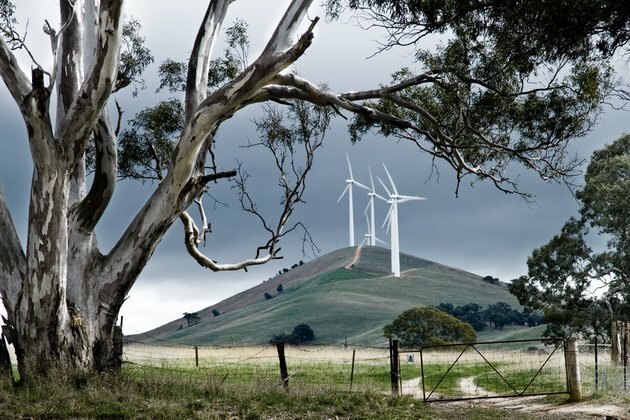The UK has a national climate change act ?why don't we?
The Conversation
16 May 2019, 07:51 GMT+10

No matter who wins the upcoming federal election, both the ALP and LNP are committed to remaining in the Paris Climate Agreement.
This means every five years Australia is expected to submit progressively stronger targets to reduce greenhouse gas emissions, and report on progress. And by 2020, Australia is expected to submit a long-term emissions reduction strategy showing how to get to net zero emissions.
Regardless of what policy mix is chosen to achieve this, the process of hitting the Paris targets is now a permanent feature of economy-wide decision-making, one that will need credible ongoing support from government and businesses. Policy uncertainty, and a lack of national framework, has reduced investment confidence.
The UK has shown how national climate change legislation can guide institutional action, and not only dramatically cut emissions, but also promote economic growth.
Victoria rolled out similar legislation in 2017, one of the first pieces of legislation in the world to be modelled on the Paris Agreement.
But Australia lacks a national version of Victoria's or UK's legislation.
We have national targets, but not yet ongoing systems embedded in departments. These systems would include measures to ensure continuous target-setting every five years (as used in other jurisdictions) with guidelines and progress reporting obligations. A lack of national legislation means the community and businesses lack transparency about Australia's long-term direction, pace and progress.
How national climate change legislation would work
A national Climate Change Act would reduce recognise climate change was not taken into account when many current laws were developed, and reduce policy instability around Australian meeting our Paris obligations by:
providing a role for governments and courts to flesh out and stabilise the low carbon transition
guiding an emissions reductions path that looks ten years ahead, across all sectors of the economy, and that can be ratcheted up if policies fail to meet their targets
ensuring transparent reporting of emissions and progress towards meeting interim Paris Agreement targets
allocating responsibilities across government for reporting and climate-conscious planning
signalling to business, communities and government agencies about emerging opportunities in a low carbon economy.
How Victoria did it
In 2017, the Victorian Labor government rolled out state-wide climate legislation, the Victorian Climate Change Act.
This legislation recognises how addressing climate change needs a whole-of-government approach, extending obligations to each state government portfolio.
And it has already catalysed climate change reporting and planning activity across government. An independent committee has been tasked with advising on the first ten years of emissions budgets.
Government departments are preparing adaptation plans for each sector, reviewing operational guidelines and establishing regular reporting of emissions in sectors and their future plans.
The UK's success story
The UK passed its Climate Change Act in 2008 with a near unanimous vote. It has guided government decisions on national energy and industrial policy ever since.
The Act contains a process for setting economy-wide, multi-year targets, generating a clear, but flexible path towards its long-term objective - an 80% reduction in national greenhouse gas emissions by 2050. It's not explicit about how targets are to be met and successive governments have been free to choose their own mitigation policies.
What has resulted is a clear shift away from the politics of the past where climate change action was traded off against other government goals.
Ever since the Act passed, subsequent UK parliaments have created management and efficiency initiatives, a minimum price on carbon (called carbon price floors), renewable energy targets, competitive reverse auction schemes and capacity markets.
Combined, these policies promote a competitive, sustainable, low carbon energy supply, along with economic growth and increased national energy security.
And the results have been extraordinary: emissions in the UK have fallen dramatically since 2008, with the UK's carbon dioxide emissions now below 1860s levels.
National transparency would improve the market
With a clear legislative process with interim targets every five years, a Climate Change Act for Australia would provide businesses and the public with a certainty around the pace of climate change action that reaches beyond the political cycles.
Governments would still have the freedom to choose interim targets and how to deliver them, but the legislation would create transparency around our obligations.
It would also ensure that a transition to a low-carbon future does not risk financial stability.
Regulatory bodies, such as the Australian Prudential Regulation Authority, the Bank of England, and the Financial Stability Board, recognise the necessity for climate change legislation to create confidence in markets. They are already applying pressure to local and international financial markets to improve disclosure of climate risk.
Finally, national legislation would ensure the market and the public are kept up-to-date about progress and future pathways, and how they can be involved in the process along the way. This includes investing in Australia's potential as a new lower-carbon powerhouse.
Let's agree what is agreed, and move on
Australian politicians don't often agree on climate change action, but the major parties do agree on Australia staying in the Paris Agreement.
A national Climate Change Act for Australia would embody this commitment, aligning us with the international process in a policy-flexible framework. Agreement on such an Act would show the Australian public that each party is serious about tackling climate change, providing a stable platform for the next parliament.
 Share
Share
 Tweet
Tweet
 Share
Share
 Flip
Flip
 Email
Email
Watch latest videos
Subscribe and Follow
Get a daily dose of Toronto Telegraph news through our daily email, its complimentary and keeps you fully up to date with world and business news as well.
News RELEASES
Publish news of your business, community or sports group, personnel appointments, major event and more by submitting a news release to Toronto Telegraph.
More InformationBusiness
SectionAI saves $500 million for Microsoft as layoffs reshape strategy
REDMOND, Washington: Artificial intelligence is transforming Microsoft's bottom line. The company saved over US$500 million last year...
FTC’s rule to ease subscription cancellations struck down by court
WASHINGTON, D.C.: A federal rule designed to make it easier for Americans to cancel subscriptions has been blocked by a U.S. appeals...
Musk’s X loses CEO Linda Yaccarino amid AI backlash, ad woes
BASTROP, Texas: In a surprising turn at Elon Musk's X platform, CEO Linda Yaccarino announced she is stepping down, just months after...
Ex-UK PM Sunak takes advisory role at Goldman Sachs
NEW YORK CITY, New York: Former British prime minister Rishi Sunak will return to Goldman Sachs in an advisory role, the Wall Street...
Gold ETF inflows hit 5-year high as tariffs drive safe-haven bets
LONDON, U.K.: Physically backed gold exchange-traded funds recorded their most significant semi-annual inflow since the first half...
PwC: Copper shortages may disrupt 32 percent of chip output by 2035
AMSTERDAM, Netherlands: Some 32 percent of global semiconductor production could face climate change-related copper supply disruptions...
Canada
SectionFedEx, UPS step up as Canada Post loses market share in strikes
OTTAWA, Canada: With Canada Post struggling to maintain operations amid labour unrest, rivals like FedEx and UPS are stepping in to...
MLB roundup: Yanks bomb Cubs on Cody Bellinger's 3 HRs
(Photo credit: Wendell Cruz-Imagn Images) Cody Bellinger hit three homers for the first time in his career and drove in six runs,...
Jays top A's as Max Scherzer gets first win with Toronto
(Photo credit: Ed Szczepanski-Imagn Images) Alejandro Kirk and Nathan Lukes each drove in two runs during a six-run fifth inning...
Paul McCartney announces fall 'Got Back' North American Tour; check out dates
Washington, DC [US], July 12 (ANI): The Beatles legend Paul McCartney is hitting the road again. The singer-songwriter has announced...
D.C. United take on Galaxy in first match under interim coach
(Photo credit: Steve Roberts-Imagn Images) Troy Lesesne paid the price for D.C. United's lackluster season and academy director Kevin...
Daily World Briefing, July 12
Chinese FM calls for joint efforts in finding right way for China, U.S. to get along China and the United States should work together...














